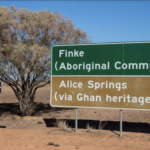The Link Between Alcohol and Crime in Australia

As a result of rising concerns about crime in Alice Springs, the Northern Territory government has reinstated bans on the supply of alcohol.
The measures, which re-implement aspects of the highly criticised Northern Territory National Emergency Response (also known as “the Intervention”), mean that Aboriginal people living in remote communities and town camps in the Territory will not be able to buy takeaway alcohol.
Whilst there is some evidence to support alcohol restrictions to tackle anti-social behaviour, the evidence for such interventions in the Northern Territory is more mixed than is widely reported.
Australia’s Favourite Drug
Alcohol remains Australia’s most popular drug, with 77% of Australians having consumed alcohol within the last 12 months, and 1 in 3 of us admit downing the booze on a weekly basis.
However, our widespread love of alcohol has some pernicious social consequences.
Around 1 in 5 Australians have been verbally or physically abused, or put in fear by someone under the influence of alcohol. Alcohol consumption remains one of the single biggest risk factors for violence in the community, and almost doubles the risk of family and domestic violence.
Alcohol consumption amongst Indigenous Australians, particularly in the Northern Territory, is complex.
Aboriginal and Torres Strait Islander people are more likely to be abstainers from alcohol than the general population. However, Indigenous Australians who do drink are more likely to do so at levels likely to negatively impact their health and wellbeing.
Heavy alcohol use by Aboriginal and Torres Strait Islander people is significantly influenced by the ongoing intergenerational effects of colonisation, including the traumatic impact of government policies such as the forceful removal of children from their communities as part of the Stolen Generations.
As a result, there are major health disparities between Indigenous and non-Indigenous people in Australia, including when it comes to alcohol-related harms.
Why Some People Are “Bad Drunks”?
Alcohol can influence anti-social behaviour either as a direct effect of intoxication or, in cases of alcohol dependency, as an incentive for theft and other economic crimes in order to feed a habit.
Alcohol intoxication has a few direct effects which may incentivise criminal behaviour. Alcohol binds to receptors in the pre-frontal cortex, the part of your brain responsible for complex behaviour and decision-making. As a result, people are more likely to make impulsive decisions when drinking.
Alcohol consumption alone has not been shown to spontaneously illicit aggressive behaviour. However, for people who already have problems with aggression the consumption of alcohol can make it more likely that they will act out violently.
Where people consume alcohol can also play a major role in the likelihood of anti-social behaviour.
“Macho” pub and club environments where men drink heavily and often compete for sexual partners, has been shown to incentivise anti-social behaviour and aggression. In contrast, drinking outside, whilst often an offence in itself, strongly correlates with a number of public order offences including public urination, trespass and vandalism.
Whilst alcohol is certainly not the sole cause of bad behaviour, it does play a role in why some people commit crime.
The Evidence Around Alcohol Bans
Limiting the supply of alcohol in certain areas has been shown to reduce some types of offending.
For example, reducing liquor outlet density and operating hours for pubs and clubs has been shown to reduce intimate violence in particular areas. Moreover, Sydney’s controversial lock out laws similar demonstrated that limiting the amount of time people spend drinking in licensed venues results in notable decreases in alcohol-related violence.
The effectiveness of alcohol bans targeting risky drinking amongst Aboriginal communities in the Northern Territory is far less clear. Evaluations of community-based restrictions in the Territory have been hindered by poor police and health data, as well as limited sample sizes.
A 2021 evaluation of alcohol policy in the Northern Territory over the last forty years found overall mixed results in reducing alcohol related harms.
Some interventions, such as minimum unit pricing, proved effective at reducing the number of alcohol related hospital admissions in the Territory. Other interventions, such as prohibitions on public drinking specifically designed to target Aboriginal people, had very little impact on overall consumption and simply shifting problematic drinking “out of sight”.
Some alcohol interventions which had initial positive results in the Territory weren’t able to sustain this impact long term. For example, the Liquor Supply Plan introduced as part of The Intervention, which reduced takeaway outlet trading hours and purchase limits on cask wine and fortified wine, led to an initial reduction in alcohol related harms, including domestic violence. However, these figures jumped back to pre-intervention levels in just 6 months.
Other interventions have not been sufficiently evaluated. For example, the Banned Drinker Register, initially attempted in 2011-2012 and then reinstated in certain areas in 2018, has only been evaluated for uptake and not impact. Little is known if this intervention has had any impact on either health outcomes or levels of crime in the Territory.
Overall, whilst there’s evidence to support restrictions on alcohol to tackle crime generally, there’s very little evidence of for any type of alcohol ban working effectively when it comes to offending by Indigenous Australians in the Northern Territory.






